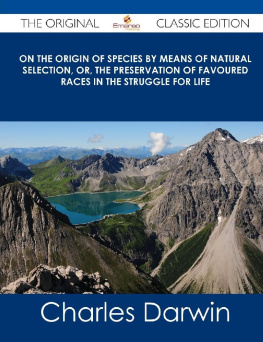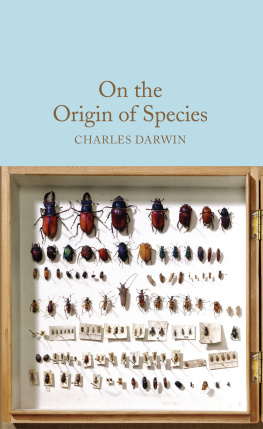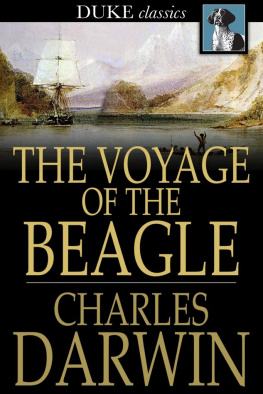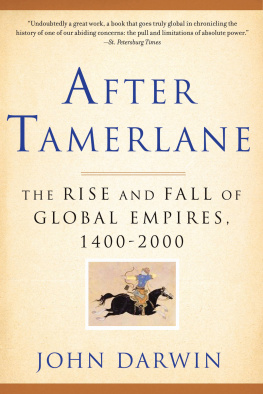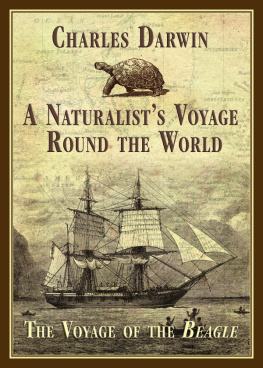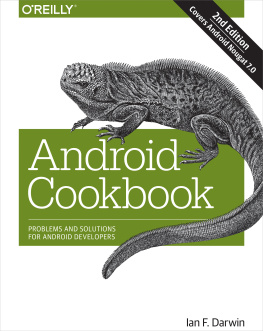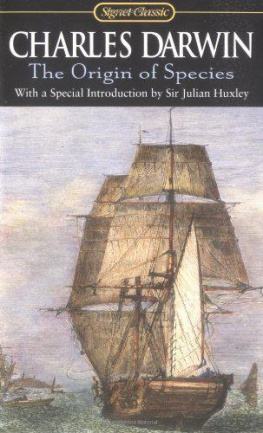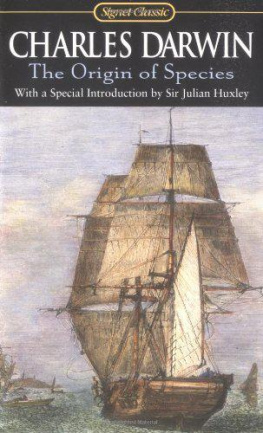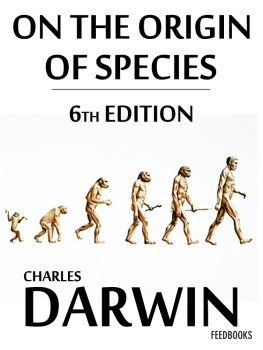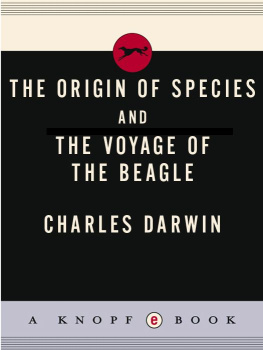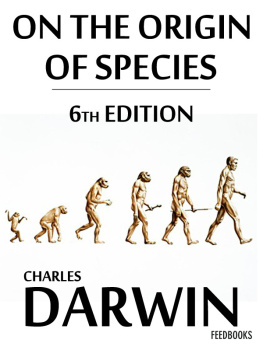The Project Gutenberg EBook of On the Origin of Species by Means of
Natural Selection, by Charles Darwin
This eBook is for the use of anyone anywhere at no cost and with
almost no restrictions whatsoever. You may copy it, give it away or
re-use it under the terms of the Project Gutenberg License included
with this eBook or online at www.gutenberg.org
Title: On the Origin of Species by Means of Natural Selection
or the Preservation of Favoured Races in the Struggle for
Life. (2nd edition)
Author: Charles Darwin
Release Date: September 25, 2007 [EBook #22764]
Language: English
*** START OF THIS PROJECT GUTENBERG EBOOK ORIGIN OF SPECIES ***
Produced by Steven Gibbs, Keith Edkins and the Online
Distributed Proofreading Team at http://www.pgdp.net
| Transcriber's note: | A few typographical errors have been corrected. They appear in the text like this, and the explanation will appear when the mouse pointer is moved over the marked passage. |
ON THE
ORIGIN OF SPECIES.
"But with regard to the material world, we can at least go so far as thiswe can perceive that events are brought about not by insulated interpositions of Divine power, exerted in each particular case, but by the establishment of general laws."
W HEWELL : Bridgewater Treatise .
"The only distinct meaning of the word 'natural' is stated , fixed , or settled ; since what is natural as much requires and presupposes an intelligent agent to render it so, i.e. to effect it continually or at stated times, as what is supernatural or miraculous does to effect it for once."
B UTLER : Analogy of Revealed Religion .
"To conclude, therefore, let no man out of a weak conceit of sobriety, or an ill-applied moderation, think or maintain, that a man can search too far or be too well studied in the book of God's word, or in the book of God's works; divinity or philosophy; but rather let men endeavour an endless progress or proficience in both."
B ACON : Advancement of Learning .
Down, Bromley, Kent,
October 1st, 1859. ( 1st Thousand ).
ON
THE ORIGIN OF SPECIES
BY MEANS OF NATURAL SELECTION,
OR THE
PRESERVATION OF FAVOURED RACES IN THE STRUGGLE
FOR LIFE.
B Y CHARLES DARWIN, M.A.,
FELLOW OF THE ROYAL, GEOLOGICAL, LINNEAN, ETC., SOCIETIES;
AUTHOR OF 'JOURNAL OF RESEARCHES DURING H. M. S. BEAGLE'S VOYAGE
ROUND THE WORLD.'
FIFTH THOUSAND.
LONDON:
JOHN MURRAY, ALBEMARLE STREET.
1860.
The right of Translation is reserved.
LONDON: PRINTED BY W. CLOWES AND SONS, STAMFORD STREET,
AND CHARING CROSS.
CONTENTS.
I NTRODUCTION
Page
CHAPTER I.
V ARIATION UNDER D OMESTICATION.
Causes of VariabilityEffects of HabitCorrelation of GrowthInheritanceCharacter of Domestic VarietiesDifficulty of distinguishing between Varieties and SpeciesOrigin of Domestic Varieties from one or more SpeciesDomestic Pigeons, their Differences and OriginPrinciple of Selection anciently followed, its EffectsMethodical and Unconscious SelectionUnknown Origin of our Domestic ProductionsCircumstances favourable to Man's power of Selection
CHAPTER II.
V ARIATION UNDER N ATURE.
VariabilityIndividual differencesDoubtful speciesWide ranging, much diffused, and common species vary mostSpecies of the larger genera in any country vary more than the species of the smaller generaMany of the species of the larger genera resemble varieties in being very closely, but unequally, related to each other, and in having restricted ranges
CHAPTER III.
S TRUGGLE FOR E XISTENCE.
Its bearing on natural selectionThe term used in a wide senseGeometrical powers of increaseRapid increase of naturalised animals and plantsNature of the checks to increaseCompetition universalEffects of climateProtection from the number of individualsComplex relations of all animals and plants throughout natureStruggle for life most severe between individuals and varieties of the same species; often severe between species of the same genusThe relation of organism to organism the most important of all relations
CHAPTER IV.
N ATURAL S ELECTION.
Natural Selectionits power compared with man's selectionits power on characters of trifling importanceits power at all ages and on both sexesSexual SelectionOn the generality of intercrosses between individuals of the same speciesCircumstances favourable and unfavourable to Natural Selection, namely, intercrossing, isolation, number of individualsSlow actionExtinction caused by Natural SelectionDivergence of Character, related to the diversity of inhabitants of any small area, and to naturalisationAction of Natural Selection, through Divergence of Character and Extinction, on the descendants from a common parentExplains the Grouping of all organic beings
CHAPTER V.
L AWS OF V ARIATION.
Effects of external conditionsUse and disuse, combined with natural selection; organs of flight and of visionAcclimatisationCorrelation of growthCompensation and economy of growthFalse correlationsMultiple, rudimentary, and lowly organised structures variableParts developed in an unusual manner are highly variable: specific characters more variable than generic: secondary sexual characters variableSpecies of the same genus vary in an analogous mannerReversions to long-lost charactersSummary
CHAPTER VI.
D IFFICULTIES ON T HEORY.
Difficulties on the theory of descent with modificationTransitionsAbsence or rarity of transitional varietiesTransitions in habits of lifeDiversified habits in the same speciesSpecies with habits widely different from those of their alliesOrgans of extreme perfectionMeans of transitionCases of difficultyNatura non facit saltumOrgans of small importanceOrgans not in all cases absolutely perfectThe law of Unity of Type and of the Conditions of Existence embraced by the theory of Natural Selection
CHAPTER VII.
I NSTINCT.
Instincts comparable with habits, but different in their originInstincts graduatedAphides and antsInstincts variableDomestic instincts, their originNatural instincts of the cuckoo, ostrich, and parasitic beesSlave-making antsHive-bee, its cell-making instinctDifficulties on the theory of the Natural Selection of instinctsNeuter or sterile insectsSummary
CHAPTER VIII.
H YBRIDISM.
Distinction between the sterility of first crosses and of hybridsSterility various in degree, not universal, affected by close interbreeding, removed by domesticationLaws governing the sterility of hybridsSterility not a special endowment, but incidental on other differencesCauses of the sterility of first crosses and of hybridsParallelism between the effects of changed conditions of life and crossingFertility of varieties when crossed and of their mongrel offspring not universalHybrids and mongrels compared independently of their fertilitySummary
CHAPTER IX.
O N THE I MPERFECTION OF THE G EOLOGICAL R ECORD.
On the absence of intermediate varieties at the present dayOn the nature of extinct intermediate varieties; on their numberOn the vast lapse of time, as inferred from the rate of deposition and of denudationOn the poorness of our palontological collectionsOn the intermittence of geological formationsOn the absence of intermediate varieties in any one formationOn the sudden appearance of groups of speciesOn their sudden appearance in the lowest known fossiliferous strata
CHAPTER X.
O N THE G EOLOGICAL S UCCESSION OF O RGANIC B EINGS.
On the slow and successive appearance of new speciesOn their different rates of changeSpecies once lost do not reappearGroups of species follow the same general rules in their appearance and disappearance as do single speciesOn ExtinctionOn simultaneous changes in the forms of life throughout the worldOn the affinities of extinct species to each other and to living speciesOn the state of development of ancient formsOn the succession of the same types within the same areasSummary of preceding and present chapters
Next page
